There is not a lot that needs to be said on this topic, but me being me, I'm going to say it anyway. The Germans occupied the vast majority of Europe. They were there, on the scene, and the local men either were not (dead, in prison camps, in hiding, fled to the United Kingdom) or were greatly diminished in status. Like soldiers of every army of every period of history, as soon as the Germans got comfortable, they started scouting around for women. And, as always in times of military occupation, there were willing women to be found.
And, sure enough, the German soldiers found them. It's not quite clear what the big deal was about exchanging clothes with your French girlfriend, but that seemed to be the thing to do. And it seemed quite common as if this was 'the proof' of, well, you know. Sort of like mounting the moose head on the wall.
The subject of collaborator girls has experienced a real surge of interest recently. There was a French documentary by filmmakers Isabelle Clarke and Daniel Costelle, who produced "L’Occupation intime" (2011) ("Intimate Occupation") on the subject.
Really, it was just like normal times. Men meeting women, a little flirtation from the back seat of your chauffeur-driven motorcar...
 |
| Nobody seems to know where this photo came from. It shows a young lady in an officer's (Untersturmführer) uniform. Women could not join SS units except as auxiliaries and certainly did not wear SS officer uniforms. If you look at this picture up on the Internet, you will see everyone stating that it is 'probably her father's uniform.' Perhaps. However, we have seen that German soldiers for some reason found it kinky to dress their conquests in their uniforms. Note that the picture is cut off from showing the pants that she probably is not wearing. This may (or may not) be simply innocent girlish fun. She looks a touch older than simply being a 'girl' still living at home and playing dress-up in her daddy's uniform, but anything is possible. If so, she may have been in the German Maidens (Bund Deutscher Mädel) auxiliary. My source identified this as Totenkopf, but close examination of the uniform suggests Prinz Eugen or another, as pointed out by a helpful commenter. |
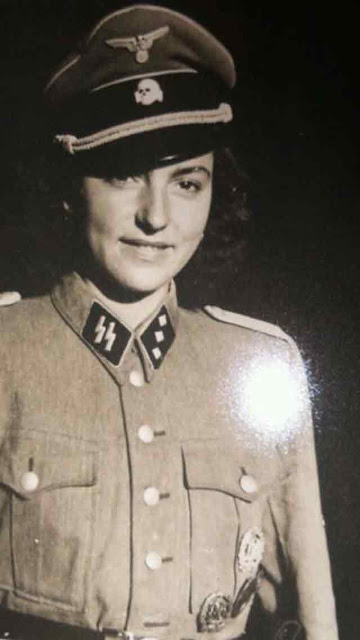 |
| The same girl from a slightly different angle. To my eyes, she looks a bit older in this shot. It appears that she has undone a button, no SS man would be seen in that sort of disarray. Since I don't know the provenance of this, the photo may be from after the war, but she could have gotten into big trouble doing this if so. |
So, you've met the young French girl of your dreams. Not quite ready for a dinner date yet. How about a quick coffee at the local Wehrmacht coffee shop, the below prehistoric ancestor of Starbucks?
Perhaps visit the Soldatenkino in Paris to take in a matinee?
The Paris racetrack is always fun with a date, but we'll have to get the tip sheet.
Or, just hang out down at the lake.
A quiet spot in town would work, too.
 |
| Rare color selfie of a Wehrmacht soldier and his girl. The soldier apparently is recuperating from a war wound and thus is playing the "war hero." Rear area hospitals were one of the few times a soldier could relax and have a little fun. |
It's summer - go to the pool!
 |
| Off-duty Wehrmacht soldier spending a day at the pool with his girlfriend. |
Some of the Germans even brought their French girlfriends back to the base with them. Oh, naughty, naughty. That had to be against some kind of regulations.
 |
| Men and a mademoiselle becoming friends, or perhaps negotiating a surrender. |
It is easy to forget that the Germans occupied Paris for over four years, Warsaw for over five years, and other major cities for just as long. What's a girl to do?
 |
| German officers got the pick of the crop. My guess is this is in Montmartre. |
That is, what's a girl to do when all the local men are locked up or working in Germany as slave laborers? The women were in their prime, truly adorable, in short-lived full bloom.
 |
| The fellow looks as if he has been injured, but he is enjoying himself now! |
Such a shame to waste that precious, fleeting time in a young girl's life. To be fair, it was traditional for women to be removed from the war, and some of them took full advantage.
Life continued naturally behind the front lines. And, naturally, things happened. Some 200,000+ babies were born to German fathers during the French occupation. There was nothing special about French women: in one of the Channel Islands, 900 such babies were registered. In Norway, 8-12,000 babies (including Anni-Frid Lyngstad of Abba fame) resulted. Such marriages also were encouraged in Denmark and Holland. The Lebensborn e. V. (e.V. is Eingetragener Verein, registered association), meaning "Fount of life," was founded on 12 December 1935 and blossomed during the war. Promoted by
Reichsführer-SS Heinrich Himmler, it was intended to reverse falling German birth rates and promote bizarre eugenics theories. In Norway, the children of these unions faced ostracization and worse fates. The mothers were called "tyskertøser," or "Those girls." The Norwegian children later sued for compensation due to the Quisling government's promotion of the scheme - but lost in 2008 before the European Court of Human Rights (the Norwegian government offered each child £8,000 anyway). This has similarities to the "Comfort women" situation in Japan, an issue that reverberates through the years.
Wars were fought in distant fields. With all of France occupied, the war to the ordinary Frenchwoman was just an occasional bombing raid or annoying news bulletin about something going on in Africa or Russia or one of those Pacific Ocean places.
 |
| The lady nearest the camera sure has a fashionable hat. |
Wars were for men. Women just floated serenely above things, and the men loved that about them. Of course, that's an over-generalization, many women worked in war plants and were partisans and the like - but it's the generalization that the Germans preferred.
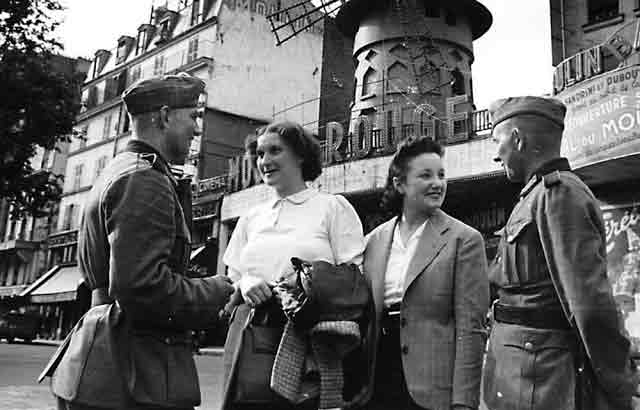 |
| A pleasant night out at the Folies Bergère or Moulin Rouge, perhaps? Possibly these fine females worked there. |
That is how many men wanted it, too. Something to fight for.
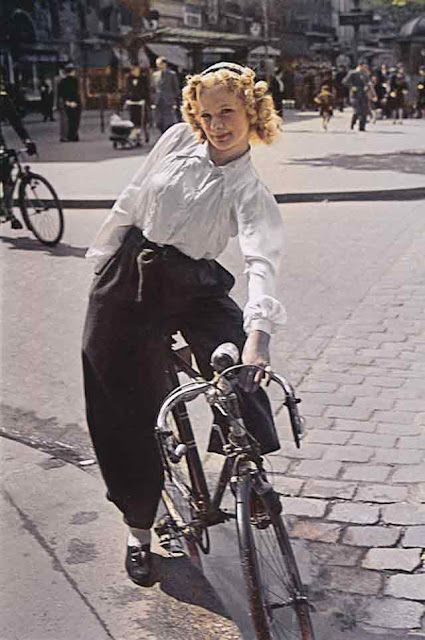 |
| Paris during the war, photo by Andre Zucca for German Wehrmacht magazine Signal. |
Everyone in the Wehrmacht knew that Paris was the place to be. The official German propaganda outlets even advertised its allures. Essentially, and this is no exaggeration, Paris became almost synonymous with "giant cathouse" in the Wehrmacht. To some extent, that reputation remains to this day in certain quarters.
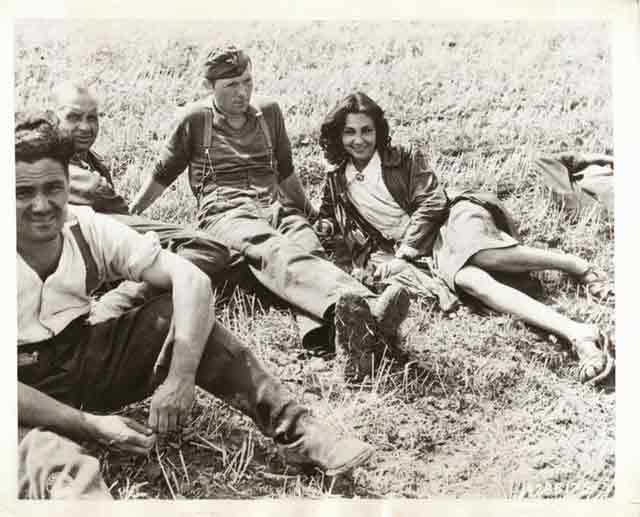 |
| French girl engaged to German soldier follows him into prison compound after his capture near Orleans by U.S. forces. This would have been around August 1944. She undoubtedly was safer in there with him than on the streets, subject to abuse by the partisans. |
Some of the women simply fell in love and married their German beau. Who could foresee that the world would change so drastically so quickly? Once in that situation, staying home became untenable - time to follow husband wherever he is headed, even if it is prison camp. And sometimes you need to put aside your cynicism - love is love, for better or worse.
 |
| Dutch woman follows her German husband into captivity. |
Conquering soldiers have a lot to offer a girl, especially a soldier who has rank and can most likely offer all sorts of inducements. Clearly, these ladies had no difficulty taking advantage of all those lonely men and offering them some solace, and the soldiers had an easy time taking advantage of naive girls who had no idea of the enormity of what they were doing.
 |
| A Wehrmacht soldier with an Italian prostitute, 1944. The picture is a full-length shot which is quite, um, revealing. I can't show you the whole thing, unfortunately (it's a great shot). Use your imagination. |
Some of the girls were just plying their normal trade, helping the local economy. The customer's politics were beside the point.
 |
| This Frenchwoman does not look like she is suffering, nor the ones in the background. |
In those days, it was customary to "promenade" either with your beau or to find one. The best promenade in Europe was at the Eiffel Tower.
 |
| No, not suffering at all. |
But you could frolic in the snow, too.
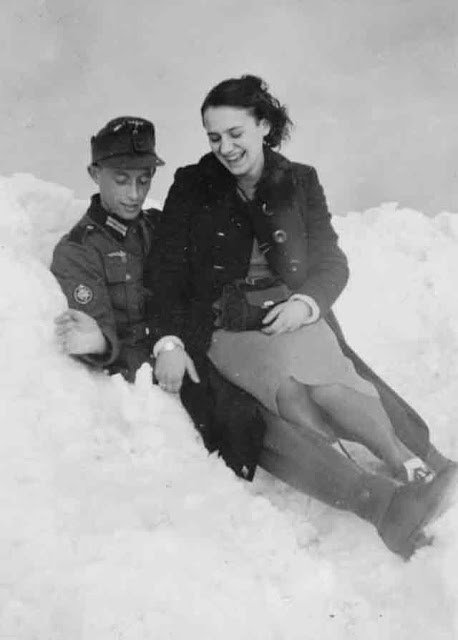 |
| A friendly visit with a Wehrmacht Gebirgsjager (mountain) Troops private in a snowdrift. She appears to have nylons on, he apparently was quite thoughtful to get them for her - nylons were absolutely cutting edge style in the '40s. |
And don't think that the ladies didn't appreciate the attention!
 |
| Well, I certainly hope she doesn't come down on the flowers... |
However, that does not mean that collaborators deserve a free pass, not by a long shot.
 |
| Unity Mitford (L) and her sister Lady Diana Mosley, nee Mitford (R) with SS troops at the September 1937 Nuremberg Party rally. The sisters were familiar faces in pre-war Germany. File KV 2/882 in the National Archives contains Secret Intelligence Service reports from 1936 stating that Unity sees a lot of Hitler when he is in Munich, acts more fascist than the actual fascists, and that she gave the 'Hitler salute' to the British Consul General in Munich. He requested that the government impound her passport. Unity shot herself on the outbreak of war, barely survived, and was repatriated via Switzerland on Hitler's own dime. |
There were collaborators all across Europe. Pictured above are mainly those from France and England, but they were everywhere.
 |
| Dutch Party girl (most likely) greets the Wehrmacht boys as they enter Amsterdam, 15 May 1940. Note the SS plates on that vehicle - SS were required to be in full camouflage (Jager, Federal Archive). |
There were collaborator girls, for instance, in Holland, though of course also many Resistance fighters there and in the other places as well.
 |
| Members of the Dutch NS maidens of the Nationale Jeugdstorm (NJS-National Youth Storm) youth movement of the NSB (National Socialist Movement of the Netherlands). Patterned after the German BDM (Bund Deutscher Mädel, or German League of Girls), the Dutch youth movement had some Dutch nationalist modifications that made it distinct from the German organization. These included greater racial tolerance and more nationalism. |
I have a
separate page about Ukrainian collaborator girls (yes, Ukraine is in Europe) who knew how to show their appreciation for a well-cut fighting man. Here, though, we focus on Western Europe.
 |
| Festival atmosphere: A French woman cavorting with members of Hitler's SS in bars and cabarets. To say that all these women had no choice is a bit much. |
It is estimated that there were hundreds of collaborators and wannabe collaborators in England. There were substantial pre-war ties between the English gentry and Germany, and this led many young English women astray. There were even special uniforms for them.
 |
| Mrs. I. M. Swire - a leading figure in the British Union of Fascists - wearing the new uniform of a grey skirt with a black shirt. Quite stylish in a dreary sort of way. |
Gabrielle Bonheur "Coco" Chanel was a top fashion designer in France before and after the war. During the war, she dated Baron Hans Gunther von Dincklage, who was a professional Abwehr spy. This enabled her to live in the Hotel Ritz in Paris (where she returned many years later) during the war, which was quite unusual for a Frenchwoman because that was where the top German brass also lived. There are documents suggesting that Coco - who was around 60 years old during the war - collaborated with the Germans. Where it gets fuzzy is exactly what she supposedly did beyond some cut-throat business dealings. One incident involved a German attempt to have her broker peace negotiations with the British around late 1943/1944. That idea collapsed when Coco's friend, an Italian lady with whom she supposedly was in love, refused to participate and carry Coco's letter to Churchill. After the war, Chanel was questioned but never convicted of any sort of improper activities. She died in her sleep at the Ritz in 1971.
 |
| Coco Chanel did not suffer many privations during World War II. |
Otherwise, the collaborator girls had fun for a while - but, eventually, things changed.
Retribution
 |
| These literally are girls, not women, but who knows what they were up to. The original caption reads, "Members of the NSB (Dutch national socialist party) and shaven 'kraut girls' are being brought in by members of the Dutch Resistance." Perhaps their parents were NSB members and they had joined the Jeugdstorm. Notice the sign the boy is holding, it may be a donkey--presumably making him out to be an ass. Note that there are three adult men behind the teenage boy, mostly hidden, and they are followed by partisans with shotguns. The photograph was taken on April 11, 1945. Location is likely the eastern Netherlands north of the Rhine at Deventer. |
Presenting what happened after liberation is easy to show. Very easy.
 |
| Members of the Norwegian collaborationist Special Squad Lola (Sonderabteilung Lola) whose mission was to infiltrate the Norwegian resistance, are being tried after the war. Spirits seem to be high - indicating the level of the callousness of these hardened war criminals. Lola worked under the orders of the SS/SD; several hundred Norwegians were tortured, and it is believed that Lola killed more than 80 people. Ten defendants, all men, were found guilty and shot. The rest (the women) received long prison sentences. Some things are never equal. |
However, explaining the aftermath of all this frivolity, and trying to pinpoint just how far justice was served and how it may have been abused, is not easy. That is a tricky subject indeed. In any event, justice was swift - perhaps too swift. Get set, here we go with some graphic pictures.
However, the Allies of course returned, and the Wehrmacht beaus of the collaborator girls left in a hurry. The Germans had their own problems, of course, often not surviving the journey home and perhaps returning sheepishly to somebody they had left behind in the Fatherland. Often, the photos of collaborator girls such as those that appear on this page are identified as "found on a dead German soldier" or "taken from a German POW." So, it isn't as though the Wehrmacht boys had much choice in the matter.
Naturally, we almost certainly would not have many of these photos at all if the soldier had survived and put them in safe-keeping. There are likely countless others sitting in long-forgotten in attics and basements across Europe.
 |
| A “collaborator” - a French woman having her head shaved following liberation, as punishment for an on-going sexual relationship with a Wehrmacht soldier during the occupation of France. There appears to be another one waiting for her turn. Even voluntary relationships were not always what they seemed. This woman, for instance, was singled out for shameful retribution following the liberation of France. She is believed to have been a prostitute who serviced German occupiers. Even though that was her business, it did not lessen her punishment. She is having her head shaved by French civilians to publicly mark her. This picture was taken in Montelimar, France, on August 29, 1944. |
Even if neither situation applied, and the German soldier made it back to Germany alive, it is difficult to do much when you are sitting in a prison camp awaiting processing, or when you are jobless due to the post-war labor laws and destitute.
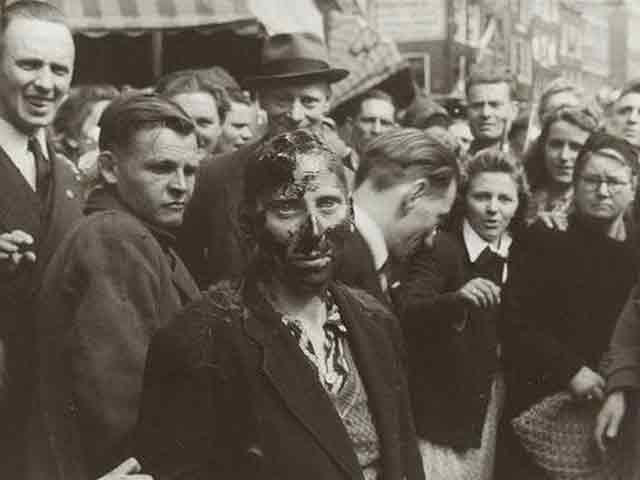 |
| World War II. Collaboration. Shaving and tarring [pitch] of ['Kraut ladies'] after the liberation of Holland. Amsterdam, The Netherlands, May 1945. The notable thing about many of these pictures is how female onlookers look almost ecstatic. |
The bottom line is that the collaborator girls were left without any protectors as the Germans pulled out, and all their friends, of course, had noticed all along what they had been doing. Scenes of tarring and feathering and hair-cutting and all sorts of retribution went on all over Europe.
 |
| World War II. The liberation of Paris, France. French women accused of collaborating with the Germans paraded in the streets. It appears they also are being compelled to give the Hitler salute, another layer of humiliation. |
There even were occasional female collaborators from the United States. Mildred Elizabeth Gillars (November 29, 1900 – June 25, 1988), for instance, was nicknamed "Axis Sally" along with Rita Zucca. Gillars was an American broadcaster employed by the Third Reich to proliferate propaganda during World War II. She was convicted of one count of treason by the United States in 1949 following her capture in post-war Berlin and served about a dozen years in prison, finally released in 1961. She later went back to college in the United States Midwest to finish her degree and lived a somewhat normal life.
 |
| Mildred Gillars. |
Case Study: Herta Kašparová
When you take on a subject as broad as this, it helps to reduce it to a human scale. That helps to illustrate what happened to many ordinary people, and also show how complex the moral questions can become. To do that, let us look briefly at the strange, sad tale of Herta Kašparová.
 |
| Herta Kašparová in prison camp. |
The German occupation of Czechoslovakia was remarkable for its indifferent brutality. The German objective, as implemented by Reichsprotektor Reinhard Heydrich and his successor, was no less than to wipe out the Czech culture and make the Protectorate of Bohemia and Moravia, as they styled it, completely indistinguishable from the rest of Greater Germany. There was a problem, however: the Czechs had their own culture and language. Fortunately for the Germans, they had Czechs willing to help them with the latter issue. One who did was Herta Kašparová, who was fully bilingual. She was a Czech living in Třešť who had been born with a defect in one of her feet or legs which left her with a marked limp. This had caused some of her peers to make fun of her - which turned out to be a big mistake.
There were many "quiet collaborators" like Herta, but one incident really stood out and probably led to her demise. In the last days of the war, the Soviets overran part of Czechoslovakia and everyone assumed that the war was over. However, in the last successful German counteroffensive in April 1945, the Wehrmacht managed to recover Herta's region for a time. The SS were determined to commit reprisals against locals who had proven themselves "disloyal" during the brief period of Soviet rule. They enlisted trusted collaborator Herta to help. She drove around the city with them in an open car and pointed out the people who had become "traitors." Naturally, the SS were not from there and simply relied upon Herta's recommendations. She spotted four young men, two of whom are believed to have been among those who had made fun of Herta for her limp, and silently pointed at them. The SS needed no further encouragement and immediately executed them.
The war soon ended, and Herta disappeared for a while in Austria. However, in 1946 she was found and brought to trial in Třešť. There was no question of her guilt, and she admitted in court:
I know that I caused the death of several people. I acted out of revenge.
Herta was found guilty of collaboration and hanged from a pole on 13 September 1946 at 18:30. Accounts from the crowd of spectators exhibit relish at the manner of execution, with the hangman actively twisting Herta's head to hasten the process and perhaps add a bit of pain.
However, the people who had bullied Herta as a child also were not justified in what they did. They certainly did not deserve death for bullying Herta, or perhaps any consequences at all, and what they did was completely legal. However, Revenge, however unwarranted or overblown, can creep in during the night through an open window ... or in broad daylight from the back seat of a car ... when you least expect it. Herta had her final revenge, as she freely admitted - and everyone knows that revenge is a dish best served cold.
Were these Reprisals Hateful Toward Women?
It is easy to apply modern standards to this process and to argue that shaving women's heads and parading them through the streets was hateful to women and so forth and so on. You know, "war on women" stuff. Well, draw your own conclusion, I don't think so. Hate ran high against all collaborators. The guys were usually just shot or knifed, or maybe beaten until they were bloody and mangled. This often was done out in the woods or in a back alley by a "committee." Much more rarely, it was a ceremonial occasion, in which case the shooting or beating took place in the town square with plenty of attentive onlookers.
 |
| French Militiaman is fastened to stake before his execution, France, 1944 - HU031043 - Rights Managed - Stock Photo - Corbis. One of six French militiamen found guilty of treason by collaborating with the Germans is fastened to a stake by a guard before his execution. September 13, 1944. |
When done formally, the collaborators were tried in an afternoon (everyone knew who had 'helped out'), then simply lined up without too much fuss or appeal and gunned down or hanged.
Trying to apply any kind of modern morality to this is pointless, those were different times and people who had been put through Hell did what they had to do without any quibbles.
 |
| A sketch drawn for the US Army 'Stars and Stripes' newspaper shows French Partisans executing male French collaborators in 1944 in Grenoble, France. Would you rather be shot - or shamed and forced to leave town forever? Not always an easy answer. |
Women also were executed, though it was not as commonly done as with the men. Sometimes, you hear people bemoaning the bad treatment of female collaborators, but they are noticeably silent about the treatment of (accused) male collaborators, who nobody really seems to give a fig about one way or the other. Shoot a male accused collaborator? Silence. Shave a female accused collaborator? Oh, the horror!
Generally, the female collaborators who were executed did things that really justified their fate, though of course there invariably will be people today who would argue that they should have been spared and just "counseled" or something. Indeed, some of the collaborators do challenge our preconceptions of right and wrong in this area, but not in quite the way that the defenders of such women intend. Ans van Dijk, for example, was an innocent Jewish woman who was in hiding in the Marco Polostraat. She was of course hunted by the Germans like other Jews, and even helped two other women go into hiding. In 1943, Ans was betrayed and arrested, facing likely death.
 |
| Five women are lined up in front of a German firing squad. The execution of hostages, especially women and children, was often used in retaliation of resistance. So, the Germans shot the women, too, they didn't care. Did that make them less sexist and thus more progressive? Celje, Slovenia.1942. |
Perfect victim and heroine, right? Much like a Capo in a concentration camp, though, Ans abruptly changed sides to save herself and agreed to help the Sicherheitsdienst (SD). She pretended to be a member of the resistance and trapped many Jews by promising them hiding places that instead turned into prisons. She even betrayed her own brother and his family to the Germans, which is about as low as you can get. After the war, Ans was arrested at the house of a friend and compelled to appear before a special court. She was sentenced to death. I am going to engage in sheer speculation here and claim that it is quite possible that this is the woman who betrayed Anne Frank and her fellow refugees - but it could have been anyone.
 |
| Ans van Dijk on trial. |
Was This "Just"?
Lest you think that the French were, oh, over-reacting or something about collaborators, well, they had some good teachers. The Germans ritualistically tied partisans to posts and shot them as spies without any fuss at all. They routinely hanged female partisans, too. Death was swift and sure.
 |
| The partisans were only following their teachers. This is the only photo of French Resistance fighters facing the firing squad at Mont Valerien outside Paris. This was probably taken at great personal risk to the photographer. |
Everyone is entitled to his or her own opinion as to what is appropriate, here we just present what happened. If you look at the pictures, you will see that some of the people taking the greatest delight in this public shaming of women, laughing gleefully, and even performing some of the haircuts, also are women. Many men, especially back in the day, felt a bit uncomfortable in this sort of situation. That reticence was absent in fellow women.
When looking back at World War II, you need to set aside your assumptions about gender and crime and punishment. Women were tough and in it up to their necks on both sides. Thinking that they were all weak, innocent victims who shouldn't be held accountable for their choices is ridiculous and actually is the sexist viewpoint. Those were different times that had draconian standards of conduct.

Everyone pretty much agreed upon what should be done, there were no "grays" in a black and white world. Everyone knew or should have known the consequences of their acts, consorting with the enemy was something that you did at your peril. Especially in Eastern Europe, the victors meted out harsh justice to everyone.
 |
| In the streets of Brignoles, angry French citizens publicly rebuke a woman who is suspected of having collaborated with the Germans. Women often were the most upset with other women who collaborated. |
Women really let their feelings show once the Germans were gone. For instance, women were just as angered by male collaborators and German POWs as anyone else - and let them know it.
 |
| A young French woman vents her anger towards a German POW with a kick. He is being escorted to a prisoner of war collection center by French soldiers in an American Jeep following the liberation of Toulon by the Free French Forces. Toulon, Var, Provence-Alpes-Côte d’Azur, France. 28 August 1944. Some descriptions of this photo state that he was a spy or turncoat who was later shot, but that is uncertain. He was probably safer under guard than in the hands of the partisans. It was a culture of brutality, the women gave as well as got. |
So, as a historical record, these photographs are important for any number of reasons: they show offenses, they show punishment, and they show universal condemnation. People are people, whether they be men or women, and when it came to collaboration, it made little difference in what you were other than a foul traitor. Barbarity has no gender.
 |
| Members of the French resistance in Cherbourg shear the hair of women who collaborated with the Germans during the occupation. |
To sum it up, when a woman who had engaged in
collaboration horizontale — and by that, we mean having sex with occupying troops — was punished, her head was forcibly shaved as the first step. Depending on how the partisans felt, she also might have been disrobed, tarred and feathered, and perhaps beaten.
 |
| Going strictly by their attire and their, shall we say, defiant postures, these may have been working girls. Parading them around like this may seem a bit much to today’s audience, but at the time, this image would have evoked feelings of victory and just retribution. Some probably wanted them shot out of hand. |
Tens of thousands of women, many of whom were merely accused of collaboration and may not actually have done anything wrong, suffered similar fates after liberation. Some were killed, a good number were beaten, and all were humiliated. And, of course, many no doubt got away with it completely and were never revealed, to live out their lives with an occasional glance over the shoulder.
 |
| Female French collaborator having her head shaved during the Liberation of Marseilles. Some of the onlookers appear quite amused. |
Another aspect of this should be noted: there was an awful lot of collaboration in France. That's just a fact. It extended throughout the government and extensively among ordinary people. Many partisans themselves had, shall we say, less-than-impeccable
bona fides and perhaps a bit of secret guilt. As in the Soviet Union, the partisans did not really become very numerous until liberation was assured - but then, everyone who could (
i.e., was not a known collaborator) jumped on the bandwagon. You can see an awful lot of posturing in the photos by crowds of partisans crowded around shamed collaborators. There is perhaps a tad too much here and there without there being some extra special motivation to "get in the shot"; everyone was anxious for documentary proof that they were on the right (
i.e., the winning) side. All that secret guilt may have caused some now identifying as partisans to act out against unmasked collaborators with a bit more emphasis than they otherwise might have if possessed of clean consciences themselves. The human psyche was at play in all its mystery.
 |
| Women who consorted with the Germans during the occupation are driven through the streets of Cherbourg by members of the French resistance. The head was shaved in order to humiliate them. The perks of sleeping with SS men were extra rations or quality food, access to forbidden luxury goods such as perfume and stockings and freedom from certain restrictions. The downside as seen by their contemporaries who later shot or ostracized and humiliated them was complicity in - or perhaps even knowledge of - the hell and slaughter of the concentration camps. |
Posing in a picture with a shorn or shot collaborator while holding a gun on them was a pretty definitive way of establishing where you stood once and for all - at least at that precise moment. This has remained a murky subject in France ever since, and from time to time the "secret files" of who really collaborated and how are threatened to be released. Everyone knows there are some "partisans" who are glad their secrets remain unknown.
 |
| A woman with a shaven head, accused of collaborating with the Germans during the German occupation of France, is marched away by a member of the French Resistance in a street at Chartres after the city's liberation. August 1944. |
Let's also go in a different direction with this. Some French women befriended (and more) the Germans because they were coerced or forced. This still angered their neighbors, who were not about to draw any fine lines or distinctions about motivation or need that a court might consider. Angry partisans did not wait for lengthy judicial proceedings to consider mitigating factors. If a prostitute happened to entertain Germans who had all the money in order to survive, well, that wasn't about to be a point in her favor with angered partisans who had lost their loved ones or homes during the occupation. It was a black and white world, and you had to choose sides. Justice, such as it was, was swift and sure.
 |
| Accused collaborators photographed after being punished by the French resistance. Weirdly enough, the resistance punished collaborators using tactics that only years earlier the Germans had used on perpetrators of “race crimes” (i.e., having sex with the wrong people) in Germany and Austria. |
 |
| Members of the French resistance lead two women accused of being German sympathizers to the local prison, where their heads will be shaved as punishment for collaboration. Notice how they are touching their soon-to-be-shorn locks. August 29, 1944. National Archives via the United States Holocaust Memorial Museum. |
 |
| A French woman collaborator and her baby, whose father is German, returns to her home followed by a throng of taunting townspeople after having her head shaven following the capture of Chartres by the Allies, August 1944. It appears that she is passing some women who suffered a similar fate. Photo by Robert Capa. |
 |
| A French woman accused of sleeping with Germans has her head shaved by neighbors in a village near Marseilles. Note the large crowd of partisans. |
 |
| In the Normandy village of Liesville, angry French patriots take hold of Juliette Audieve, thought to have been a collaborator with the Germans. It appears the two ladies standing casually by are also partisans. |
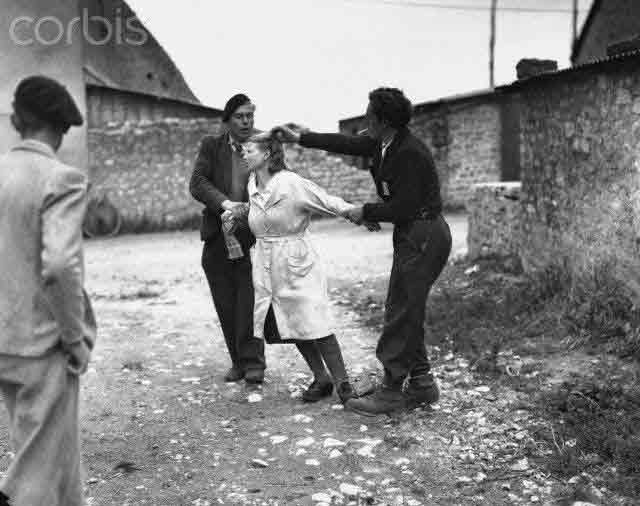 |
| Moments later, the two French patriots try to cut off the hair of Juliette Audieuve as punishment for collaborating with the German forces occupying France during World War II, Liesville, France, 1944. | Location: Liesville, Normandy, France. |
 |
| There she goes under the scissors. |
 |
| A collaborator being humiliated, with the usual crowd of people trying to be above suspicion. |





































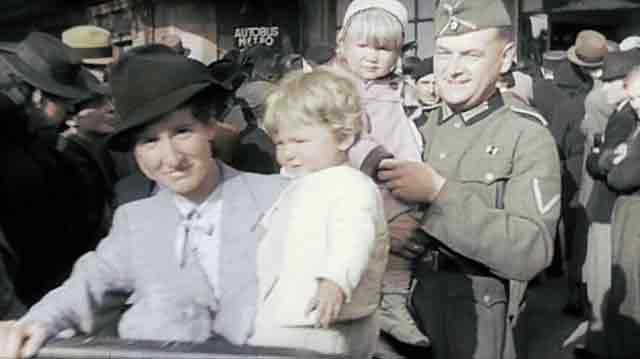

























A lot of little people got caught up in the big event. But lets not forget that Churchill, Hitler, Roosevelt and Stalin were all psychopaths. Lots of blame to go around.
ReplyDeleteAGREEEEEEEEEEEEEEE!
DeleteVery true
DeleteChurchill and Roosevelt? I really hate revisionist history. They were men of their times and should be judged so.
DeleteFew people note or even realize that being a irregular partisan can be considered a crime under international laws of war. If a partisan's nation has already surrendered under terms agreed to, any further fighting is a criminal act. In fact, Germans called partisans "terrorists," which under the law they certainly were. And, people who continued to fight after their nation has accepted terms and stopped fighting, may be executed, which the Germans also did. Executions of partisans by Germany was a perfectly legal act with some exceptions. The Allies who never surrendered also executed numbers of spys/terrorists too. Russian partisans were considered differently under the law than French partisans, because the Soviet Union never surrendered. Rather than terrorists, Russian partisans were irregular military forces. It's complicated --- Vichy France was to be self-governed according to the surrender terms of 1940. But, Vichy was occupied by Germany later in the War contrary to the surrender agreement. Hence, French partisans in the properly occupied northern France were criminals by law, while those in Vichy were not!
DeleteChurchill and Roosevelt were not "psycopaths" if you have even the merest understanding of the term. Stalin and Hitler were worse than psycopaths IN the true definition of the term.
DeletePretty sure it wasn't Stalin or Hitler that instantaneously incinerated a city full of civilians. Twice.
DeleteSo, prefer they due by other means? Strange comment.
Delete"The downside was complicity in - or, at the very least, likely knowledge of - the hell and slaughter of the concentration camps." ??? "complicity"? Come ON! It's very unlikely that the pillow talk of German soldiers having sex with French women was about gruesome topics like the concentration camps. And even if it did take place, the women had no part in the crimes. Let's be realistic, OK?
ReplyDeletefunny how after a war everybody seems to want to punish the Little fish, and as here Young girls WHO for the wast majority had done nothing wrong , but Falling in love with a Young soldier! they didn't rat out anybody, they just wanted to feel alive! not every german soldier wanted to hurt the civilians, and after the liberation a lot of American soldiers actually treated the women and the general population of the occupied territories alot worse than the germans ever did! raping and looting! and then I haven't even started about what the russians did on their way through europe!
DeleteMost women have no loyalty to their tribe or their race! Just look at Europe today, it's like a Box of Smarties. White women going with every color but their own.
DeleteBut they are very quick to remember what some bloke did 40 years ago and now accuse him of molesting them, when he felt their ass. If there is something in it for them, they would accuse Christ himself!
No wonder your unkown.
DeleteThe photograph of the pilot and a woman on the Me109 is not of a German pilot and a French collaborator. It is a photo of Finnish Air Force Ace Olli Puhakka and a lady friend (presumably also Finnish). The giveaway is the swastika marking which is the insignia of the Finnish Air Force.
ReplyDeleteReference: https://web.archive.org/web/20130423092448/http://www.sci.fi/~fta/finace06.htm
Thanks for the ID, I'll take that one off.
DeleteGlad to help. Thanks for the insightful article. By the way, did you know that an article on warhistory online uses a large portion of your text and a lot of the photos. Your work came out first on 22 September 2014, and the warhistory online entry is dated 12 February 2015. I could not find any attribution to you on the warhistory online page, which I think you deserve, IMHO. The URL is
Deletehttp://www.warhistoryonline.com/war-articles/78558.html
Best wishes.
Thanks for the heads up. That is pretty lame that they would copy me. Everything on this site is my own work from start to finish, with the assistance, of course, of the original photographers.
DeleteJust as a follow-up to this, their editor responded to me in most gracious fashion and they will take care of it with attribution etc. He seems to be a gentleman, it is nice to deal with people like that. The matter is closed. I appreciate the heads up on this.
Delete"A friendly visit with an SS man in a snowdrift."....This is not an SS man, it is a Wehrmacht Gebirgsjager (mountain) Troops private....
DeleteThanks. Looking at it closer, I believe you are correct and I have made the change. The collar confused me.
DeleteImagine if we were all considered guilty of something simply by being accused of doing it? I imagine that there were a good many people who were punished and shamed as collaborators but who in fact were not and also many who were collaborators but were never exposed to such shame, assault and ridicule. War is an ugly business and obviously peace as well.
ReplyDeleteOh, for sure, Anne. I can well imagine how some groups had a grudge against so-and-so who maybe had a little too much money for their liking or did such-and-such that they didn't like. Then, when the time came, they could "notice things" and drop the hammer. That is just part of human nature and vigilante justice, not everybody is noble and good on either side of the coin and mistakes will always be made. That is why due process is so important, one of the great advances of civilization. Unfortunately, civilization went on vacation during and immediately after World War II.
DeleteJust check out the witches in Salem, or any of the pogroms. It usually comes down to greed.
DeleteImagine the soilders were female, hand on heart who would have said no?
ReplyDeletehttp://mjdvr.tumblr.com/post/52815073745/a-young-girl-dressed-in-what-is-probably-her
ReplyDeleteThe Girl in the SS Uniform is not from the Totenkoph Division. All SS Officers had the Deaths Head on their Peaked Caps. See the link provided, or look up SS Cuff Titles. Interesting Article by the way.
Hmmmm, yes indeed. I will make a change, thanks. Very observant.
DeleteWar is Hell, Revenge is as well. Piety is the Father of both. Great Piece James thank You for your study of the Human ?Beast .
ReplyDeleteThank you very much, Rhonda. This is all about you the reader enjoying this page, so I greatly appreciate that.
DeleteWomen being arrested and punished everywhere, but what happened to the Paris police force, among other acts of collaboration they rounded up Jewish children and forced them on the trains bound for the death camps of Germany. I suppose this lot got away with it ?
ReplyDeleteThanks for the response, John. I think I can pretty much guarantee with 100% accuracy that a "Lot got away with it."
DeleteHere's a thought: Just what exactly is collaboration? Is it just informing on people? How about if you are a butcher and you sell the enemy meat - is that collaboration? What if you just just smile at someone at the wrong time and someone notices - are you a collaborator? If you work in the government and they order you to assist in rounding up criminals while the enemy is in charge - is that collaborating?
There were all sorts of fine lines drawn. Basically, just staying in the country and helping the economy run was, in a larger sense, collaborating. The lines are murky, and people were forced to draw their own lines as they saw fit. Very few were holier than the Pope in this regard.
С шлюхами воевать гораздо легче чем с немцами с которыми они спали !!У нас в СССР тоже женщины спали с немцами но их не тронули в крайнем случаи 5лет давали за пособничество врагу .
ReplyDeleteThe best way to punish a French person would be to make them bathe.
ReplyDeleteyou bathe in a bath
DeleteAfter all,it comes down to one simple word, JEALOUSY...
ReplyDeleteNo ,I find nothing wrong the punishment of shaving there hair ,they collaborated with the enemy they enjoy there time with the enemy,pay back time you lose.
ReplyDelete
ReplyDeletesome of the female collaborators were actually agents getting information from the Germans to pass on to their superiors, to help the war effort for France and Europe. They were not allowed to identify themselves during or after the war, talk about their secret work, and took the punishments with the real collaborators. There were good people and bad people. People went into survival mode, some helping others, and some only thinking of themselves. People suffered and were hungry for a very long time. I cannot imagine how horrible it was to live through the occupation of France by the Germans and then find out about the murders in 300 death camps throughout Europe during the war and all of the rapes, starvation, death, and murders that followed after the war.
All understandable and nothing new. The men of a losing tribe have their women raped and watch as other women attracted to the conquering warriors sleep with them while many of the local men are sent into slavery.Then should the tide turn the once defeated "heroes" who couldn't defend their women take out their mortification on those women and bravely pillory them.
ReplyDeleteExcellent article,very informative . I have yet to find an in depth book about this subject.
ReplyDeleteExcellent article,very informative . I have yet to find an in depth book about this subject.
ReplyDeletePunish them; execute them, ostracize them. Anything valid.
ReplyDeleteBut do not humiliate them. That puts you below them.
"When a human being is humiliated; the whole humanity is humiliated".
Excellent article. Very informative. Thank you.
ReplyDelete